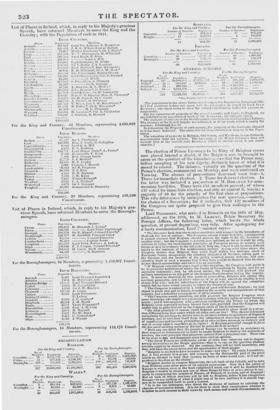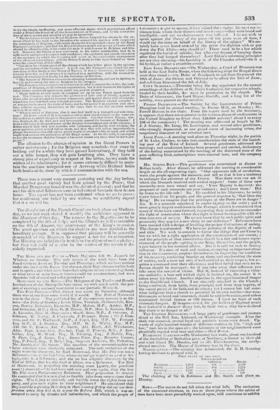The election of Prince T.EOPOLD to be King of Belgium
seems now placed beyond a doubt, if the Belgials can be brought to agree on the question of the boundar.e.,s,-so that the Prince may, before accepting of his new dignity, distinctly know of what it is meant to consist. The debates, virtually on the question of the Prince's election, commenced on Monday, and were continued on Tuesday. The classes of propositions discussed were two-1. Those for immediate election. 2. Those for deferred election. In the latter was included a proposition of M. Ron.kut.x-Thr com- mencing, hostilities. There were 185 members present; of whom. 137 voted for immediate election, and only 43 against it, leaving a majority of 89 for the priority of the first class of propositions. This vote determines by anticipation the next question,-namely, the choice of a Sovereign ; for it indicates, that 137 members of the Congress are quite prepared to give their suffrages to the Prince.
Lord PONSONBY, who arrived in Brussels on the 26th of May, addressed, on the 27th, to M. LEBEAU, Belgic Secretary for Foreign Affairs, the following letter, which treats the whole question, at present depending. very fully. After apologizing for a hasty communication, Lord l'ONSONBY say's- "The Congress finds that the treaties constitute, with respect to the boundaries of Holland, the law of nations. The Congress cannot violate that law; consequently it cannot consent that Belgium should assume the right to fix the frontiers of another state ; but the Congress is neVertheless inclined, as far as it shall be able, without violating the fundamental principles of European policy, to remedy such things a may be contrary to the interests of Belgium, where it can be done without injury to the interests of the neighbouring nations. Acting with these views, the Congress desire's that Belgium may place itself within the ordinary circle of European States, recognizing the common obligation of Treaties. taking part in the burdens and the benefits of the policy received among nations, and con- stituting itself in such a manner that it may have a right to demand that all other States should acknowledge and treat it as an associate. " If Belgium consents to place itself in this situation, the Congress will assist it by its powerful mediation to obtain the Duchy of Luxemburg by treaty, and for an equitable indemnity ; and, by effictual means, the Congress will prevent any military interference on the part of the German Confederation during the negotia- tion. It must be observed, by this mode of proceeding, Belgium will obtain this territory peaceably, and for ever-whereas it is at least uncertain whether it will obtain it by war ; and the inhabitants of the Duchy will be spared the calamities which fall on those whose country becomes tl:e theatre of war.
" The Congress is animated by a feeling of good will towards Belgium ; its real object is peace now and in future, founded on the security and independence of that country, and a definitive arrangement of all its interests.
" The Congress would, therefore, see with pleasure the Belgian Congress elect some Sovereign who might not personally interfere with the rights of other Govern- ments ; and it will recognise with particular satisfaction the Prince on whom the Belgians seem especially to have turned their eyes, provided that the Congress will enable him to place himself in the common circle of the Governments. " On what principle of reason could Belgium pretend to place itself in a situa- tion different from that under which all other nations live i Why should it demand exclusively the privilege to dictate laws to all other nations on questions of disputed territory, and to withdraw itself from the obligation of observing the general rule of negotiations and treaties, pretending all at once to have recourse to violence and war to secure what it considers as its rights ? Is Belgiumpowerfte enough to force the fire great military nations of Europe to subscribe to its wishes? " Does any one think that the people of Europe can be excited to resistance to their respective Governments in order to enable Belgium to destroy the authority of treaties, the only principle that preserves nations from a perpetual war. There can be no more action. and dangerous error than such an opinion. "The Great Powers are sufficiently aware of their true interests not to dispute among themselves on the Belgic question-that is to say, on the question whether treaties ought to be observed. On the contrary, they will act with unanimity, and they will have the concurrence and the approbation of their people. "Belgium is excited to have recourse to arms-and why ? To retain Luxemburg. But it may possess it in peace and security for the thousandth part of the price which an attempt to keep that country by force of arms would cost : is it not im- prudent to hesitate on the choice ? "Belgium desires to conquer Maestricht, the left bank of the Scheldt, and to take from Holland some other parts of its ancient possessions. Now that the policy of Europe is evident, even to the least enlightened mind, can it still be doubted that Belgium is unable to obtain any one of these things by force of arms, unless it suc- ceeds in conquering the armies of France, of Prussia, of Austria, and of England ? Not an inch of Dutch territory will be left to Belgium, unless it has vanquished Europe-to say nothing of what it might lose of its own territory if it should hap- pen to be vanquished itself in such a contest.
" It is for the statesmen who direct the destinies of nations to calculate the chances of successive defeat. It is for them to show their countrymen whether it Is better to seek success iu their views by such means and in such circumstances, or to try the simple, inoffensive, and more effectual meant which negotiations afford under a Prince the friend of all the Governments of Europe, and in the consolida- tion of whose power and security an may be interested.
" The hesitation which his Royal Highness Prince Leopold has shown in the an- swers which he has made to the Deputies who sounded his opinion with respect to the sovereignty of Belgium, sufficiently shows the disinterested nature of his Royal righness's principle and that his Royal Highness would not accept a Crown which should be offered to him, if he could not wear it with honour to Belgium and him- self. However, the Prince is now convinced, to his entire satisfaction, that he is sufficiently authorized to expect with confidence the equitable and speedy execution of the measures by which the Congress will assist in the satis'actory arrangement of the afftirs of Luxemburg; and the Prince is rkady to take upon himself as Sove- reign the completion of this affair. "Can there be a better proof of the change which has taken place in the opinion, anti the resolution of the Congress A week a;ro the Congress considered the pre- servation of that duchy to the House of Nassau, if not as necessary, at least as ex- tremely desiribte. and at present it is inclined to a mediation, with the avowed in- tention of obtaining that duchy for the Sovereign of Beleitim. " The honour of Belgium consists in obtaining Luxemburg, and not in fighting to have it, and insuring the ruin of Belgium by the struggle. "The Congress does net pretend to interCere in what concerns the rights, the inde- pendence of Belgium, or its internal organization, but it will maintain the rights of other States against all aggression, tinder any pretext whatever. " There shall be no new mode of conquest set up by one Power apart from the rest. The Congress wiil remain the protector of laws and of liberty, against all those who should attempt to become conquerors, and against those who should dis- regard any lows but their own will and pleasure. The Belgians cannot consider it as wise policy to asset t the right of force, and to i•ecognize it as supreme and abso- lute, without exposing themselves at the same time to see the doctrine turned against thin selves. What is asked of Belgium, that it may find itself in a tranquil and safe situa- tion ? All that is asked of it is to condescend to show itself subject to the same po- litical ditties to which the great Monarchies solimit. Can that which France, Aus- tria, England, &v. &e. find just and honourable, wound the honour of Belgium ? I have Confitence in the good sense of the Belgian Government and of the country • I flatter myself that they trill consider with calmness, and decide with wisdom, Ale great question which, is laid before them, and that they will refuse imprudently to plunge themselves into difficulties which would lie created without need, and which might lead even to the extinction of the Belgic name. As for the debt, I can repeat to you the as.urance that the Congress has never meant any more than to mere pro- posals."
The allusion to the change of opinion in the Great Powers is rather unfortunate ; fur the Belgians may conclude, that since by holding out for a while they have gained Luxemburg, if they hold out a little longer, they will gain Lemburg also. They have a strong plea of expedemcy in respect of the latter, laying aside the wishes of its inhabitants ; for it seems extremely difficult to main- tain the maritime independence of Antwerp while Holland holds both banks of the river by which it communicates with the sea.



























 Previous page
Previous page